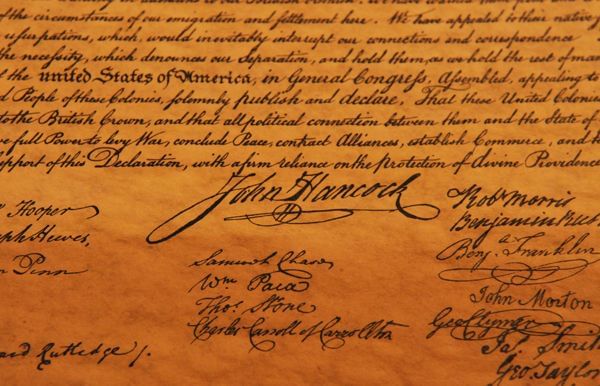Declaration of Independence and First Amendment
A detail of the signatures on a copy of the Declaration of Independence owned by Roger Sanborn of Greenbush is seen here on Friday, Dec. 9, 2011. Sanborn found the document in the back of a framed picture he picked from the trash 20 years ago. (Bangor Daily News Photo by Kevin Bennett)
The facts reflect that the Declaration of Independence are so unique in that it describes God and His supremacy in the founding of our government in four different ways:
- 1. Laws of Nature and of Nature's God
- 2. Creator
- 3. Supreme Judge of the world
- 4. Divine Providence
The very fact that our Forefathers emphasized their faith in God by using such descriptive words to explain their faith in Him tears down the misconception of the fallacy of the term "separation of church and state" which they did not use in any of our Founding Documents. Our Forefathers obviously did not intend any separation of their Faith in God from our government. Fact: By the 1st Amendment they were saying that they did not want God put into the box of a national denomination. They wanted free religious expression of their belief in God and the influence of God on our government, but they did not want any one denomination to have preference over another denomination by government edict. The very fact that our Founders held, church services in our nation's Supreme Court offices, our Treasury office, and the Rotunda of our Capitol proves that they expected complete freedom of religious expression by our people and our government.
Preamble of the Declaration of Independence (July 4, 1776)

First Amendment (December 15, 1791), was added to the Constitution of the United States of America, along with nine other amendments, which together compose The Bill of Rights.
Summary of the Declaration of Independence
Congress asked Thomas Jefferson and others to write a declaration of independence. They needed a summary document to declare why the colonies had to become independent of Britain. In this document, Jefferson wrote what many Americans believed about their rights. Jefferson wrote that people have the right to live, the right to be free, and the right to seek happiness. The Declaration explains why the colonies should break away from Britain. It says that people have rights that cannot be taken away, lists the complaints against the king, and argues that the colonies have to be free to protect the colonists' rights. At the bottom of the document, the delegates signed their names.
The Importance of the Independence: Jefferson wrote that if a government does not protect the rights of citizens, people have the right to form a new government. This idea was not new. Jefferson used ideas that John Locke and other English thinkers had written about. Jefferson listed many ways that Britain had not served the colonists. He wrote, for example, that King George had tried to take away rights and force taxes on the colonies. Jefferson showed that the colonists had a right to separate from the king and have their own government. The Declaration of Independence was approved on July 4, 1776. The Declaration is still important because it says the American people believe in equal rights for all. Today we know that the words "all men are created equal" include everyone: women, men, children, and every race, group, and ability. But in 1776, people's ideas were different. Only white men who owned property had the right to vote. Laws that recognized equal rights of other groups were passed later.
The First Amendment
Congress shall make no law respecting an establishment of religion, or prohibiting the free exercise thereof; or abridging the freedom of speech, or of the press; or the right of the people peaceably to assemble, and to petition the Government for a redress of grievances.
